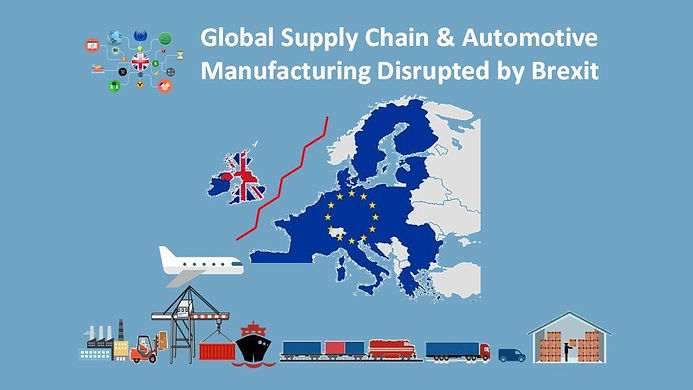
Global Supply Chain & Automotive Manufacturing Disrupted by Brexit
In this globalised world, everything is inter-connected. Goods and services will follow the route of least friction. As a result, wherever there are free trade agreements in place, goods and services will flow more easily with companies and consumers enjoying the benefits in terms of price/cost.
Moreover, trade agreements will also provide competitive advantages to countries and/or regions, that will also make them more attractive for investments in various industries. Even for the manufacturing value chain, the final product may be assembled in a country with components coming from all over the world. Subsequently the final products will be then re-exported out to the global markets.
This means that Brexit will put at risk the global supply chain and manufacturing within the United Kingdom (UK), European Union (EU) and globally. The current and future impact on the UK automotive industry is slowly showing the consequences of supply chain and manufacturing disruption.
Manufacturing in the UK
According to World Bank data, although the percentage of manufacturing to the UK gross domestic product (GDP) has been declining throughout the years, it still represents about $226 billion, approximately 9.7% of the British economy. About 80% of the UK GDP is related to the services sector, representing about $1.87 trillion in 2016.
Moreover, data from the British Office for National Statistics show that the value of UK manufacturers’ product sales reached £364.7 billion in 2016. Food production and automotive are the two biggest segments of the manufacturing industry, representing £66.5 billion and £54.8 billion in 2016 respectively.
In fact, in 2016, not only the automotive sales grew the most by 12.8% from 2015, but automotive manufacturing reached also its highest with more than 1.7 million cars built in the UK. While 80% of these vehicles are exported globally, the EU represents the majority with 56%. This means that with Brexit, if there are no trade agreements in place by 29 March 2019, all these British automotive exports will be eventually affected.
As a result, the automotive manufacturing in the UK will also be highly impacted. Auto parts from Europe, Japan and other parts of the world will eventually be slapped with tariffs in the UK. In worst case scenario, they even get stuck at the customs since everything is still unclear; thereby stalling the whole manufacturing supply chain. Similarly, manufactured parts from the UK, that are exported to other car manufacturers, may also be blocked at other custom borders.

There is a critical need to conduct major scenario planning to identify critical activities/processes, that will need contingency planning so as to avoid a complete shut-down. Automakers may eventually need to implement organisational strategies, that may either divert critical manufacturing activities in the UK to other places or completely by-pass the supply chain activities that link up with the UK.
Automotive Industry disrupted
According to the Society of Motor Manufacturers and Traders (SMMT), the automotive industry is a key sector for the UK. It has developed so much that not only are there operational efficiencies via the clustering of the many R&D centres as well as other automotive related companies around the major vehicle manufacturers, but there is also a critical mass of highly skilled engineers and workforce supporting all these activities.

However it should be noted that all the major car manufacturers are now owned by foreign companies. Iconic luxury British brands like Rolls Royce, Bentley, Jaguar Land Rover are now owned by BMW, Volkswagen and Tata Motors respectively.
Even mass market brands like the Mini and Vauxhall are now owned by BMW and PSA Peugeot Citroën. As for the Japanese car manufacturers as well as American Ford, they have all spent decades and billions to develop their activities in the UK with the main aim of exporting their manufactured cars to the EU.
Brexit is going to have a significant impact on the automotive industry in the UK. With customs and border controls, the production supply chain will be affected. Moreover, without clear guidelines in terms of how goods are going to move in and out of the UK, the automotive supply chain and manufacturing may eventually be disrupted.

That is why automakers are already preparing for the worst and have been reducing their investments in the UK. According to SMMT, from £2.5bn invested in 2015, this dropped to £1.66bn last year and for the first half of 2017, investment dropped to only £322m.
Moreover, with Brexit, not only the British automotive exports will no longer have free access to the EU, but all the automotive parts from other European equipment manufacturers will also be slapped with duties when they are imported into the UK; thereby increasing the overall cost of car production. Hence all automotive companies (UK and non-UK based) will have to implement relevant strategies to plan for Brexit disruptions.
With Brexit and without any trade agreements in place, the automotive sector will become uncompetitive. In the worst case scenario, all these foreign owned automotive companies may stop investing further in the UK and delocalise their UK-based manufacturing activities to Europe, Japan and other parts of the world.
